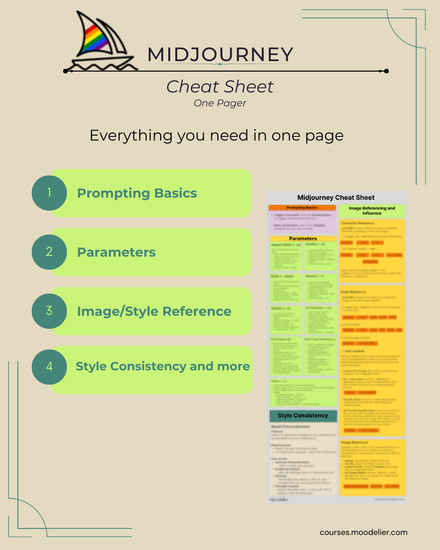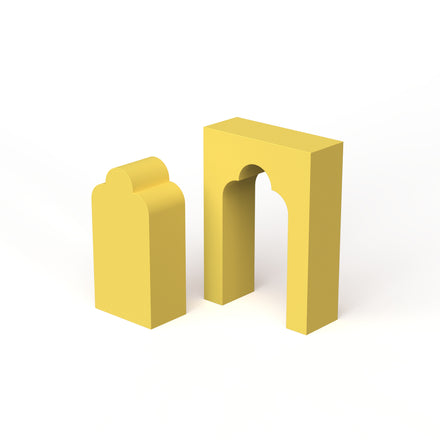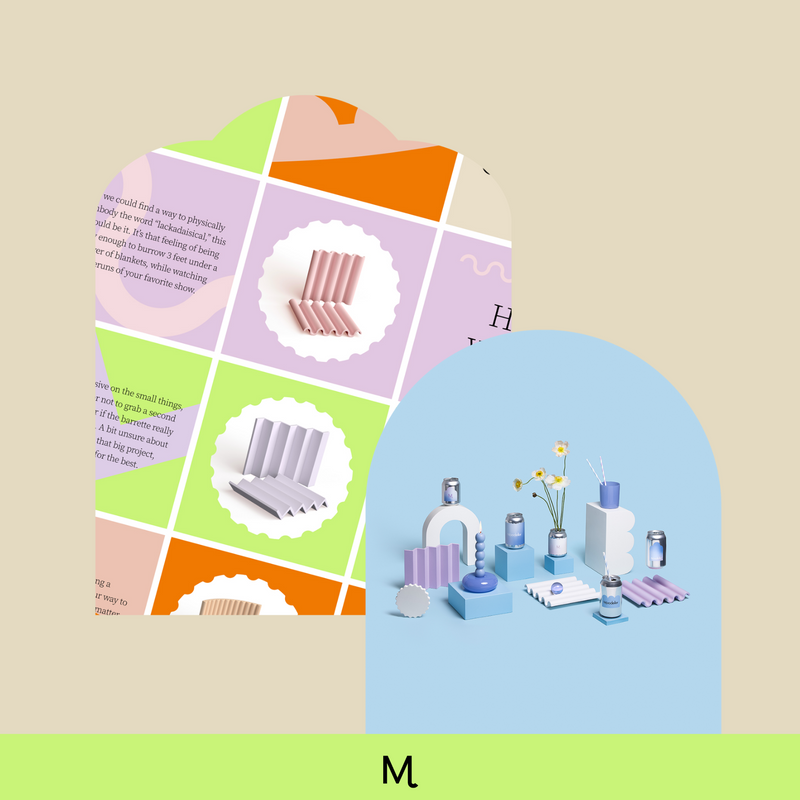It’s difficult trying to make everything happen on your own, isn’t it? As a creative, it can be easy to undertake everything at once - and actually believe that it’s the right thing to do. Look, we’re creatives, right? We can create for our clients, so we assume that we should be equally capable of creating for ourselves, while also serving as the accounting team, financial advisor, CEO, CMO, COO, customer service rep, and certified problem-solver for our own business and brand.

" So, read Rocket Fuel, identify whether you’re a visionary or an integrator, and then hire for your counterpart. "
Well, the question isn’t so much about can or can’t - it’s more so about should and shouldn’t.
Pretty early on in Moodelier’s conception, I (Claire here!) realized that it was time to to bring on some expert-level help, in order to give my brand the jumpstart it needed. Because regardless of my past experience and the fact that I technically could get it all done by myself, DIYing my entire brand just wasn’t the most feasible or wise thing to do.
So, let’s discuss a few things: when to hire, how to hire the best person for your needs, and my own outsourcing experience as a founder and solopreneur.
When it’s time to hire
This will sound trite, because it is - only you can truly know when it’s time to hire.
Someone might tell you that 6-12 months into your business is the best time to bring in help, but that has nothing to do with how quickly or slowly you scale, or what your personal and professional growth might look like.
So, here are some signs that can be a great indication that it’s time to outsource:
*You find yourself constantly running out of time, and unable to thoroughly complete all of the things you need in order to grow your business.
*When it comes time to brainstorm and create, you’re mentally drained and exhausted.
*You feel frustrated completing certain tasks, and find that you keep putting them off for “later.”
*You’ve pushed out the launch, relaunch or rebrand of your own business, site, marketing funnel or product a few times, because “it’s not the right time.”
We’ve all felt a few of the things on that list. That’s normal - it’s because we aren’t created to do everything, and do it well.
It’s nearly impossible to be an incredible visual creator AND a tax and accounting expert (for example). Unless you’re an actual genius, balancing those two acts would feel debilitating.
So, if you said yes to any or all of the signs above, it may be time to outsource.
How to find the right hire
Before you start reaching out to fellow freelancers, there are a few things to take care of on your end. You’ll want to mentally walk through a few questions, like:
What tasks or jobs do I specifically want to outsource?
What’s my monthly budget?
How soon would I want this person to start?
From there, it’s up to you where you choose to find your next hire. For us, hashtags and network referrals have worked out well. By searching through hashtags, we’ve been able to peruse potential team members’ work and portfolios, and get a feel for those candidates. When people are referred to you by those you trust, it’s an even more thorough step in the vetting process (i.e., much easier for you).
Now, when you finally choose someone to chat with, it’ll need to come down to more than just hitting it off with that other person, right? When making your first (or next) hire, you’ll want to:
1) Make sure they can do the job, obviously.
- Ask them questions: Do they have…
- The material they need to do the work you are requesting (i.e. if they work remotely: a computer, internet access, software, etc.)?
- Previous experience in this specific work, or potentially an example of something similar they can share?
- The ability to work independently? Does it sound like they’ve read through the specific job description or tasks, and are confident in their ability to understand and step up to the plate? Are they critical thinkers, if that’s what the job requires?
2) Make sure their availability matches up with your needs.
- What are their working hours? Will they be online when you will be? Is it feasible (and necessary) to have time allotted in order to hop on a call and get each other up to speed? Are meetings necessary for their position?
- Will the role require a certain level of schedule flexibility? If so, are they flexible and happy to be flexible? If you’re a product shop, for example, there may be days where the inbox and order fulfillment system hear crickets, and others where customer requests and emails can be all-consuming. If the person is fulfilling a role where this could be a factor, you’ll want to make sure it’ll be feasible.
As a reminder, it is against the law to require that a freelancer or contractor work set hours or a set schedule, unlike hiring an employee. So, a certain level of flexibility needs to be had on your side as the founder, too. What do you need, and what would be nice to have?
3) Have an open discussion about pay and hours.
This might be common sense, but discussing pay and hourly expectations (or scope of work for project-based freelancers), is crucial to the success of your partnership. You could share your budget, and/or ask them for their proposal, based on your needs. Being that the person you’re reaching out to is technically an expert in their field, they should be putting together a detailed breakdown of everything you mention needing help with, and how that scope would look on their end. If they don’t, ask them to! It’s important for you to know:
- What they identify as a need, and what they suggest would be the next best step.
- How the tasks would be taken care of, and when.
- What their rates would be, based on your budget and scope of work.
4) Discuss their previous experience, and how it applies to your brand.
Talk through a project they’ve completed before. Ask about their inspo and style - if it’s a creative role (say, an Art Director), ask how they manage a project, or work with their colleagues on set.
Ultimately, you as the brand owner will know better than anyone else what kind of experience and personality is needed on your team. And if you’re having a hard time defining that, we recommend checking out Rocket Fuel. Bar none, Rocket Fuel was one of the main instruments to Moodelier’s hiring and outsourcing success - the book teaches on identifying your strengths, and hiring for your weaknesses.
Many times, we believe that we need to hire someone who matches us and our personality perfectly. The truth is that if our business needed more of us, we wouldn’t need to outsource at all. So, read Rocket Fuel, identify whether you’re a visionary or an integrator, and then hire for your counterpart.
" If you find that after a full 60 days, they still aren’t handling the work you’re assigning them in the way you’d like them to, you’ll know at that point that it’s time to move on. "
Our Hiring Experience
It’s no secret that Moodelier was, and is, my baby. Isn’t that the way it always is, though?
Roughly 2 months into planning for Moodelier’s official launch, I realized that it was time to bring in an integrator - someone who could rise to the occasion, take my vision, and bring it to life. Someone who wasn’t *quite* so easily distracted by the errant thought or a new product idea.
Once I realized that I needed an integrator, I broke down the list of tasks that were either a) taking way too much of my time or b) really unpleasant for me. From there, I realized that I needed a project manager.
I’ve been lucky enough to hire from a pool of incredible referrals in my creative network, which dramatically improved the hiring process for me. Since the official launch of Moodelier, I’ve hired my part-time project manager, who handles the day to day and makes sure the business keeps itself running while I create. I’ve also had the opportunity to add a content creator and copywriter to the team.
By outsourcing the tasks that didn’t fulfill me creatively (or simply weren’t my strong suit), I was able to unlock more of my own potential, and give myself the time I needed to create. I thoroughly believe that because of the help I brought on to my team, I was able to launch not just one, but two courses in 2020 and ideate an entire line of new products. Had I let my mind become bogged down with the things that didn’t light me up, I’m confident I wouldn’t have achieved the things I did.
I won’t fool myself into thinking that every hiring experience will be as successful as my own - you might find that you’ll need to hire tentatively, and inwardly give that person a trial run of two months. If you find that after a full 60 days, they still aren’t handling the work you’re assigning them in the way you’d like them to, you’ll know at that point that it’s time to move on.
But as with all things, fellow creative, I want to urge you to do this: enjoy the process, and learn from your mistakes. But hopefully (because of our wonderful hiring tips), you won’t have any mistakes to learn from, after all.
xx Claire & the Moodelier team










New Comment